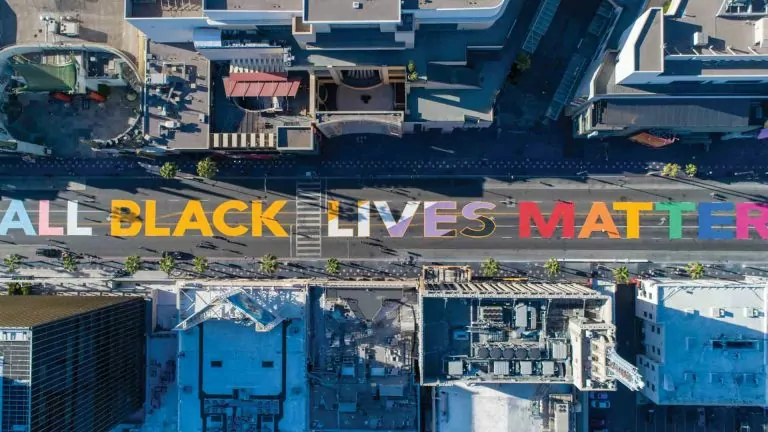Since Christians must oppose
the abortion-supporting,
LGBT-agenda pushing
Black Lives Matter organization
should we still be embracing
the Black Lives Matter slogan?
****
This article is also available in an audio version on YouTube, and on the Focal Point podcast site.
The death of George Floyd in May was met with chants across the US, and in other countries too, that: “Black lives matter!”This cry, being undeniably true, resonated with Christians, leading many to march, and others to “black out” their social media pages in solidarity.
But as clear as it is that Christians must not be racist and must fight against this sin, what I am presenting in this article is why both the organization Black Lives Matter, and even the slogan itself, shouldn’t be embraced by Christians.
Why?
Accusations need to be specific to be actionable
To begin, the entirety of the movement is based on the blanket assertion that by simply being Black, a person is oppressed. The claim is made that there aren’t just individual cases of discrimination, but there is “systemic racism” – it is a feature of, and built right into the whole fabric of our culture and institutions, public and private.
It is important to understand that there could well be evidence of systemic racism or other individual racism, but the first step to addressing problems is identifying them…specifically. Where there are specific examples given of racial injustice, we can then work to find specific solutions. If police are targeting Black drivers in expensive cars, or for driving through a rich neighborhood, that would be racial profiling and would be wrong. This specific problem would require specific solutions such as restricting police officer’s ability to pull over vehicles without evidence of just cause or probability. If Black people are being killed in “no-knock” police raids – operations where the police break down the door without first identifying themselves – this specific problem could also be addressed with a specific approach that might involve completely re-examining this practice.
To be sure, widespread systemic racism has existed, with laws in the US that restricted where Blacks could sit, or eat, or even what water fountains they could use. And examples could persist in certain institutions today. But those laws are now gone. And for many years there has been an effort towards affirmative action, both codified (by law) or de facto (local hiring policies), opening greater opportunities for historical minorities to have a better chance for post-secondary education or certain jobs. We could explore the pros and cons of affirmative action in a future article, but the point here is only to note it was certainly an effort to address systemic racism and to provide increased opportunities for those whose opportunities may have been lacking.
Unspecified claims of systemic racism suggest that it is intentional and state-sponsored; that the cultural power elites have set up a system where they can continue to suppress any opportunity that Black people, or members of other racial minorities, could have of empowerment. How they account for the many successful and middle-income members within the Black community is not very clear. They don’t fit the victim narrative and their success seems to be either ignored, or they themselves are attacked as sellouts (as Larry Elder highlights in his new documentary Uncle Tom). The idea of systemic racism does not allow much room for individual success for Black people, and any example of such success isn’t allowed to counter the narrative of oppression.
The point I’m trying to make is that we can address specific problems with specific solutions. In contrast, it is impossible to fix nebulous unspecified problems, especially with riots and looting.
The BLM organization is specifically anti-Christian
Why we should not support the Black Lives Matter (BLM) organization becomes clear when we take a closer look at what that organization supports. This is from their website:
We are self-reflexive and do the work required to dismantle cisgender privilege and uplift Black trans folk, especially Black trans women who continue to be disproportionately impacted by trans-antagonistic violence.
It is not a societal “privilege” when your sexuality and gender match – it is healthy, natural, and normal. The Creator God made it so. It is possible that this division between gender and sexuality becomes normal language even among Christians, and we must resist this, entirely.
We have to understand that we are up against a Great Deceiver, who is prowling around like a lion seeking to devour. There is a battle going on for us and our children and we need to equip ourselves and our young people with clear unambiguous language about the created order. Where there is evidence of gender dysphoria, then empathy, compassion, and help should be readily available; but by seeking to “dismantle cisgender privilege,” and “uplift Black trans folk” the BLM organization is attacking what is good, and celebrating what is broken. They boldly state:
BLM foster[s] a queer‐affirming network. When we gather, we do so with the intention of freeing ourselves from the tight grip of heteronormative thinking, or rather, the belief that all in the world are heterosexual (unless s/he or they disclose otherwise).
The “Black Lives Matter” slogan has many people thinking this is about racism. To be sure, the organization addresses racism in its statement of faith, but the organization’s focus is fixated on sexuality and gender identity too. By using charged language of “freeing ourselves from the tight grip of…”, they are affirming that all those who are not part of the cultural elite (white, male, able-bodied, cis-gendered, etc.) are oppressed. They hate the idea that heterosexuality is normative, but as Christians, we confess its normative status from creation. We acknowledge, in humility, that there are Christians who struggle with same-sex attraction and the church needs to develop greater empathy for such brothers and sisters, but that does not take away from the norms that God has established in creation.
As we look through their website their radical anti-Christian intent becomes more and more clear.
We disrupt the Western-prescribed nuclear family structure requirement by supporting each other as extended families and “villages” that collectively care for one another, especially our children, to the degree that mothers, parents, and children are comfortable.
The very foundational structure of civilization, all civilizations, is the family unit. It is the Christian worldview that highlights the importance of fathers and mothers, both. God created both male and female in his image; God demands that children honor both father and mother; the Triune relationship includes that of Father and Son, etc. While Christians express the importance of belonging to the communion of saints or the “extended family” and “village” that “collectively cares for one another,” we stress the biblical truth that the primary responsibility for children are parents, both fathers and mothers. It is the task of both parents to train up their children in the fear of the Lord. You’ll also notice that BLM mentions mothers and parents in this statement, but not fathers specifically. They are focused on ensuring they don’t make any allusions to anything that could be remotely close to patriarchy. They would object to orthodox churches refusing to allow women to serve in the office of elders and deacons. They would object to asking a wife if they would “honor, love, and obey” her husband. Any language that suggests that a husband is the head of his household would be forbidden.
The BLM slogan is 100% true and still shouldn’t be embraced
The brand “Black Lives Matter” was strategically chosen. Who can disagree with it? Black lives do matter, and all people, especially Christians, must fight injustices including racism. But we may not support in any way, shape, or manner the BLM movement which ties the slogan and organization so tightly together.
We need to see that the driving force behind the Black Lives Matter movement is an organization that is entirely ungodly, unchristian, unbiblical, and wrong. It is a deceptive movement, seeking to deceive whole nations of people in an effort to portray all the things God teaches us are right and good, as being wrong and unjust. And their influence is seen everywhere, especially, these days, on the professional sports playing field. Might it be time for us to stop watching NBA basketball or NFL football, since these organizations have embraced the Black Lives Matter movement uncritically, and ideologically? Maybe it is time we stop cheering and spending money on BLM ideologues and their paraphernalia whether that is pro-sports or any other organization.
Going forward, we will have to choose our words carefully. When we want to express how unjust racism is, we will have to find another way than to echo a slogan that is tightly linked to so much more than the words it says. Perhaps we can find a way to say that all people of all races are “image-bearers of God”? We can no longer use “black lives matter” because it implies that we agree with the organization and what it stands for, but we don’t, and we can’t.
I want to conclude this article by suggesting that BLM is not the root of a new tree, but it is a fruit of a tree planted many years ago. The founders of BLM are synthesizing instruction from those who have gone on before them including Karl Marx and Saul Alinsky – one of the co-founders has even described herself and her colleagues as “trained Marxists.” In future articles, I hope to explore some of these foundational developments that have provided the fertile soil for BLM and other such causes.
May the Lord help us to remain diligent in keeping his Word, using it as a light to our path, shining the light of His Word on the darkness around us. We are the salt and light in this world; let’s be sure we know what needs preserving and how to preserve it.
*****
What could we say instead?
If we can’t join in the chants of “Black Lives Matter!” what can we say instead? Imagine this: what if Christians who were upset with the seemingly cavalier death of George Floyd would have responded with “George Floyd was an image-bearer of God too”? That would have underscored the importance of treating him and everyone as persons with dignity and respect. It also would have been specifically targeted to George Floyd’s death.
To address the larger challenge of racism, some have suggested “Black lives matter too!” The benefit of adding “too” makes it clear that the sentence itself is not racist. It highlights that racism against Black people is a problem while also recognizing that all races matter.
Would a phrase like “Erase racism” capture the same point? Perhaps “Christians against racism” could be a phrase we “meme-ify.” It demonstrates Christians’ opposition to racism, while also confessing we are followers of Christ.
Finally, a more wordy suggestion, but that would include the reason for why we oppose racism: “The New Jerusalem will be filled with a mosaic of peoples. Stop Racism Now.” Our anticipation of the perfection that is to come should motivate towards working towards the standards of perfection. As R.C. Sproul and Ligonier Ministries remind us regularly, “Right Now Counts Forever.” So, right now, let’s do our best to hold up every human being, from conception to natural death, as the image-bearers of God that they are, and demonstrate our desire to help those who may be victims of racism.
Chris deBoer is the Executive Director of the Reformed Perspective Foundation and the host of the Focal Point podcast. Picture credit: Shutterstock.com/Footage Force.











